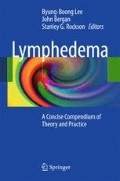Abstract
Lymphedema of the extremities is caused by insufficient transport of tissue fluid via the lymphatics. The inadequacy of the lymphatic conduits is most commonly caused: (a) by their obliteration after infectious inflammation and subsequent scarring, (b) by their interruption during lymphadenectomy, and (c) after local irradiation and trauma. Impairment of transport capacity is the consequence of anatomical lesions caused by destruction of valves, degeneration of muscle cells, and obstruction of lumen by clot and external fibrous scarring.
Access this chapter
Tax calculation will be finalised at checkout
Purchases are for personal use only
References
Rijke AM, Croft BY, Johnson RA, de Jongste AB, Camps JA. Lymphoscintigraphy and lymphedema of the lower extremities. J Nucl Med. 1990;31:990-998.
Olszewski WL, Jain P, Ambujam G, Zaleska M, Cakala M. Where do lymph and tissue fluid accumulate in lymphedema of lower limbs caused by obliteration of lymphatic collectors. Lymphology. 2009;42:105-111.
Olszewski WL. Contractility patterns of human leg lymphatic in various stages of obstructive lymphedema. Ann NY Acad Sci. 2008;1131:110-118.
Olszewski WL, Jain P, Ambujam G, Zaleska M, Cakala M, Gradalski T. Tissue fluid pressure and flow in the subcutaneous tissue in lymphedema – hints for manual and pneumatic compression therapy. Phlebolymphology. 2010;17:144-148.
Olszewski WL, Jain P, Ambujam G, Zaleska M, Cakala M, Gradalski T. Tissue fluid pressure and flow during pneumatic compression in lymphedema of lower limbs. Lymph Res Biol. 2010; (in press).
Szolnoky G, Lakatos B, Keskeny T, Varga E, Varga M, Dobozy A, Kemeny L. Intermittent pneumatic compression acts synergistically with manual lymphatic drainage in complex decongestive physiotherapy for breast cancer treatment-related lymphedema. Lymphology. 2009;42:188-194.
Andersen L, Højris I, Erlandsen M, Andersen J. Treatment of breast-cancer-related lymphedema with or without manual lymphatic drainage – a randomized study. Act Oncol. 2000;39:399-405.
Vignes S. Management of following breast cancer lymphedema. Bull Cancer. 2007;94:669-674.
Olszewski WL, Engeset A. Intrinsic contractility of prenodal lymph vessels and lymph flow in human leg. Am J Physiol. 1980;239:H775-H783.
Brennan MJ, Miller LT. Overview of treatment options and review of the current role and use of compression garments, intermittent pumps, and exercise in the management of lymphedema. Cancer. 1998;83(12 suppl):2821-2827.
Olszewski WL, Jain P, Ambujam G, Zaleska M. Newly formed tissue fluid channels take over the fluid flow burden in long-lasting lymphedema of lower limbs. Lymph Res Biol. 2010; (in press).
Author information
Authors and Affiliations
Editor information
Editors and Affiliations
Rights and permissions
Copyright information
© 2011 Springer-Verlag London Limited
About this chapter
Cite this chapter
Olszewski, W.L. (2011). Physiological Principles of Physiotherapy. In: Lee, BB., Bergan, J., Rockson, S. (eds) Lymphedema. Springer, London. https://doi.org/10.1007/978-0-85729-567-5_26
Download citation
DOI: https://doi.org/10.1007/978-0-85729-567-5_26
Published:
Publisher Name: Springer, London
Print ISBN: 978-0-85729-566-8
Online ISBN: 978-0-85729-567-5
eBook Packages: MedicineMedicine (R0)

